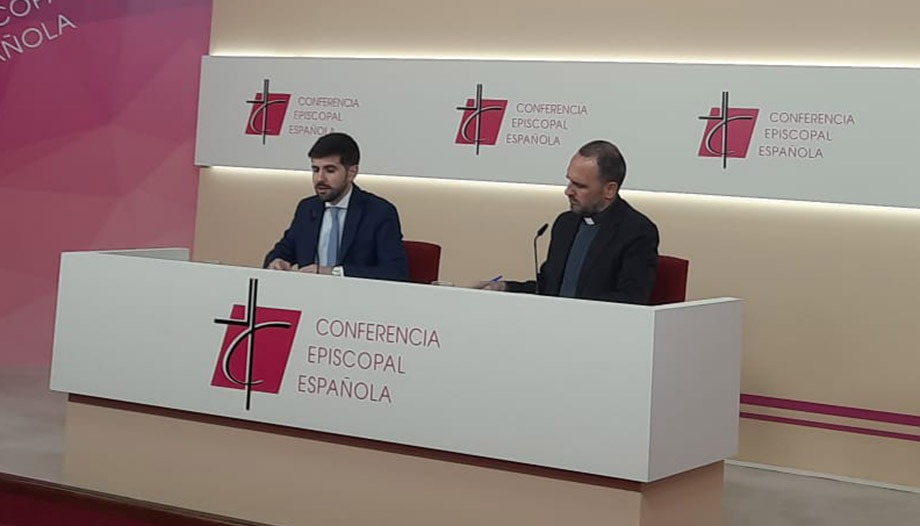 "With less money the Church has had and has to do many more things."
"With less money the Church has had and has to do many more things." José M. AlbaladThe parishes have been the 'field hospital' requested by the Pope".
José M. AlbaladThe parishes have been the 'field hospital' requested by the Pope".They are Tino (Faustino), 50 years old, from a village in Tarazona, who was helped by an 80-year-old parish priest to leave the world of drugs and "rediscover God", and who reflects the work of the Church in the rural world; or Rosa and Maria, from a senior center of the Church in the diocese of Segovia.
The story of Blanca, 37 years old, Honduran, from the diocese of Cadiz and Ceuta, who has been able to set up "her little shop" and become self-employed, after arriving alone in Spain 6 years ago, and who shows the work of the Church with migrants and refugees, at a time when the Church is turning its attention to the millions of Ukrainians fleeing their country. Blanca is precisely the person featured in the poster of this year's Campaign.
Or the story of rapper Guillermo (Grilex), who has gone on to sing songs of light and hope, and that of Father Álvaro, a Guatemalan, who is now a priest and chaplain at a penitentiary center, and who could have been an inmate, he says. Or that of Erika, 44 years old, with two children, whom Caritas has helped to get training and find employment.
To more than 4 million people
These are some of the stories, collected in the portal portantos.esJosé María Albalad, director of the Secretariat for the Support of the Church in the EEC, presented the data of the 2022 campaign, accompanied by José Gabriel Vera, director of the Communication Office of the EEC and of the Secretariat of the Episcopal Commission for Social Communications.
José María Albalad stressed that marking the X on the income tax return "helps to support the immense work carried out by the Church in Spain", which in its most social aspect "reaches more than 4 million people". Behind the X of the Income "there is a story," he said. That work is "a high-impact social shield, a field hospital in this wounded world," as Pope Francis recalled.
The campaign will be carried out from next Monday through posters, TV and radio spots, social networks (for the first time in TikToK, looking at young people), and the newspaper in sustainable support. Xtantos will have a print run of one million copies, which will reach the 23,000 parishes in the Spanish dioceses. All the details will be explained there, and some hoaxes and fake circulating around the financing of the Church.
Marking the X on the Renta is "a free and democratic decision" that has no cost, added José María Albalad, and it is possible to simultaneously mark the X box for the Church and the one for other social interest purposes.
"With less money, more things."
The investment in this Xtantos campaign stands at 2.68 million euros, VAT included, which is around "1.2 percent of what is expected to be collected". In the 2021 campaign, corresponding to the 2020 fiscal year, in the midst of the pandemic, there was an increase of 40,000 income tax returns in favor of the Catholic Church compared to the previous year, and taxpayers marked the X for a total amount of 295.4 million euros, with a decrease of 5.58 million compared to 2019.
"With less money, the Church has had and has to do many more things," explained recently the vice-secretary for Economic Affairs of the EEC, Fernando Giménez Barriocanal, for whom the decline was "logical and foreseeable" given the economic crisis generated by the pandemic, and at a time, moreover, when the work of the Church has multiplied due to the difficult circumstances.
Giménez Barriocanal insisted at the time, as reported by OmnesThe two allocations, that of the Church and that of other purposes of social interest: "it doesn't cost us more or we will get back less, and we can help twice as much by checking both boxes".
José María Albalad and José Gabriel Vera recalled some data from the Church's Activities Report. Last year's income from the Income Tax (295.4 million euros) represents about 21 percent of the budget of the Church in Spain (slightly over one billion euros), 80 percent of which goes to the dioceses and 20 percent to various activities.
A good part of the X of the Renta corresponds to the maintenance of the clergy, such as this parish priest from a village in Tarazona who appears in the campaign, and who helped Tino to get out of the "hell of drugs", as Tino himself points out in the video.











